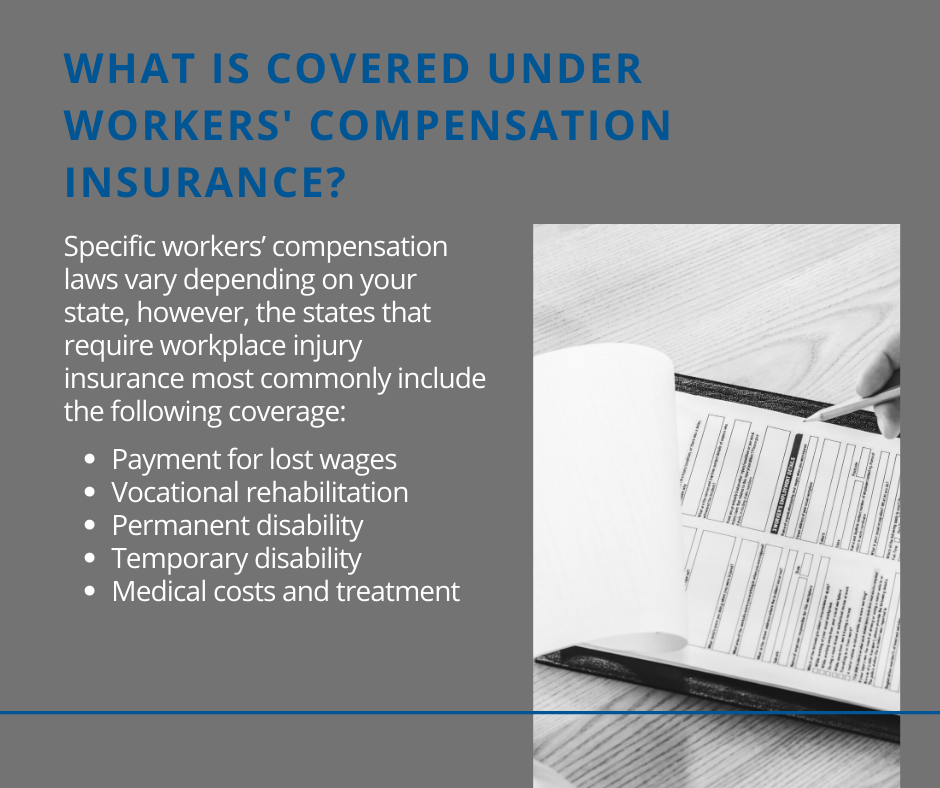Most states require employers to have workers’ compensation insurance. These insurance policies can help recover most of your employee’s lost wages while they recover from their injury or illness. It also helps to cover your employee’s medical expenses as it provides your employee’s family with death benefits if they unfortunately pass away.
What is workers’ compensation insurance?
Workers’ compensation insurance is a policy that provides medical benefits and wage compensation to workers injured on the job in exchange for eliminating their right to file a lawsuit against their employer’s negligence.
Workers’ compensation benefits are designed to help employees if they are unable to work, to cover medical expenses, as well as other expenses and rehabilitation costs associated with the disability or illness. As you look to explore workers’ compensation options, it’s important to look for one that provides adequate coverage and compensation for your employees.
When you invest in a properly designed policy, it can help ensure you and your employee remain financially secure. It’s also important to look at the benefits that are offered within your policy. Typical workers’ compensation insurance policies cover medical benefits.
What is covered with workers’ compensation insurance?
Specific workers’ compensation laws vary depending on your state; however, the most common compensation states that require workplace injury insurance include the following coverage:
- Payment for lost wages
- Vocational rehabilitation
- Permanent disability
- Temporary disability
- Medical costs and treatment
How to prepare for employee claims
Accidents happen. It’s part of life. It doesn’t matter how safe your business is, there is always a chance an employee will get sick or injured on the job. Nearly every state requires business owners to have coverage for their employees; however, states have various regulations. Ensure you have an expert on your team to help understand what your specific business needs are. For example, if your business is in California, you are required to obtain workers’ compensation insurance with only one employee. In Florida, however, you need this coverage if you have at least four employees.
Signing up for workers’ compensation depends on the location of your business. Typically, states recommend you purchase workers’ compensation insurance through a private insurance company. Others may require you to buy it through a state-run insurance fund.
It’s also important to understand the cost associated with investing in workers’ compensation insurance. The risk associated with your specific business will determine the cost of your insurance payments. The costs associated with not having workers’ compensation insurance might be the motivation you need to start considering your options.
Without workers’ compensation insurance, you put you and your business at risk of fines, and potential jail time for not complying with regulations. If an employee runs into a problem that would have been covered by workers’ compensation insurance, you may be responsible for covering their expenses, and you may also open yourself up to litigation.
Connect With Us Today
What you need to know about workers’ compensation and COVID-19
COVID-19 has brought new issues related to workers compensation. There is a lot of gray area in defining where employees contracted COVID-19. Meaning the community-spread illness territory is a bit murky. Generally speaking, workers’ compensation insurance typically does not cover community-spread illnesses like the cold or the flu because they cannot be tied directly back to the workplace.
The pandemic, however, has posed a more unique circumstance, as jobs not typically considered hazardous have become more dangerous for workers. Those deemed ‘essential,’ like health care workers, mass transit operators, and grocery store workers are at a higher risk of contracting COVID-19.
In order to ensure your employees feel safe and you manage your risk, you should implement COVID-19 policies. As your employees return to the workplace, ensure you have policies and procedures that protect your employees.



